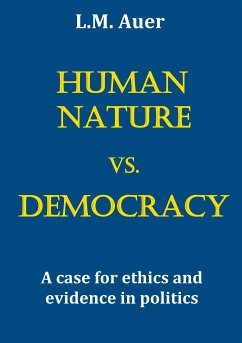Modern liberal democracy is praised in a universalistic Western view as the best political system and a quasi-prerequisite for full acceptance by the community of traditional hegemonial States. However, democracy is fully developed in only less than five percent of States globally, and in decline in most Western countries. In this book, democracy is presented as a political system in danger due to its intrinsic flaws and tendency to self-destruction. The major flaw is that "human nature" is not adequately considered in democracy's conception: its citizens, "We, the people", as individuals and as crowds, are liberated into a dangerous ideology prioritizing "freedom from society" over "membership in society" and thereby causing decline in libertinism, hedonism and polarization in divided and finally broken societies. Proposals to resolve the rapidly growing crisis include education of citizens into the ethics of reciprocal altruism, grounded in evidence from biological sciences and humanities, professionalization of politics, and a fundamental change of politics towards evidence-based decision-making, thus ending politicking, politicians' personality affairs, and the cold war of political parties, the representative of class warfare in the sheep-skin of "interest-group pluralism". The author uses his background in human biology and psychology to discuss the relevance of philosophical and politological issues around democracy raised in past and recent literature, and to highlight the prospects of using scientific knowledge for evidence-based socialization of the "human factor".
Dieser Download kann aus rechtlichen Gründen nur mit Rechnungsadresse in A, B, BG, CY, CZ, D, DK, EW, E, FIN, F, GR, H, IRL, I, LT, L, LR, M, NL, PL, P, R, S, SLO, SK ausgeliefert werden.









